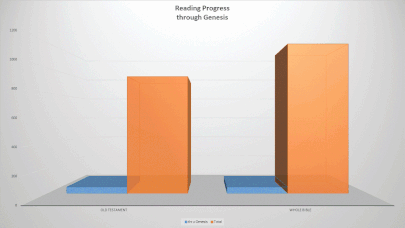Week Three Reading Assignment:
Genesis 47 - Exodus 19
"Do not think that I came to abolish the Law or the Prophets; I did not come to abolish, but to fulfill. For truly I say to you, until heaven and earth pass away, not the smallest letter or stroke shall pass away from the Law, until all is accomplished. Whoever then annuls one of the least of these command-ments and so teaches others, shall be called least in the kingdom of heaven; but whoever keeps and teaches them, he shall be called great in the kingdom of heaven."
(Jesus in Matthew 5:17-19 NASB)
(Jesus in Matthew 5:17-19 NASB)
THIS WEEK'S VIDEO: ISRAEL'S FAMILY TREE
making progress
|
We will finish reading the first book of the Bible -- the Book of Genesis -- this week. And when we do, the chart above illustrates where we will stand in our reading of the Old Testament and in our reading of the entire Bible. Keep up the good work!
|
what is it? It's a major theme!When the manna first appeared on the ground one morning in the wilderness, the Israelites looked at it and asked, "What is it?" That's where the name comes from. That's what the name 'manna' means.
Now, so many centuries hence, we may begin to answer that question. Not that we can answer what it was in terms of its ingredients, but we may look back and make substantive observations about the manna's role in Israel and in Scripture. Each of these deserves elaboration, but for the present let us at least note and watch for the following: The manna was miraculous, and yet it was also daily. As such, it bore witness to the reliable faithfulness of God. At the same time, it became a kind of exercise to train Israel to trust God daily. The manna taught and reinforced the importance of the Sabbath. Manna was a gift from God, and yet it became at times the subject of the people's complaints. Israel's experience with the manna is probably behind the line in Jesus' prayer that asks, "Give us this day our daily bread." In the Gospel of John, manna is referred to as "bread from heaven," and ultimately is used to point to Jesus. Manna was one of only three things kept in the Ark of the Covenant. |
good book review:
|
LEAGUE OF NATIONS: FOUNDING FATHERS PART 2
Last week, we introduced the theme of nations, and we touched on some of the Genesis accounts of how various nations came to be. The origins of the nations is not just a passing fancy for the biblical author. It is a central theme with genuine theological significance.
In the weeks and months ahead, we will unpack the major, ongoing theme of nations. As we do, the significance of the early stories of their origins will be more fully understood. For now, we turn to the most important origins story of all.
The nation of Israel is arguably the central human character in the Old Testament. Israel's creation, Israel's growth, and Israel's experience combine to form Israel's testimony. Israel's relationship with God and His plan for her are the central issues in the story of the exodus, the giving of the law, and the preaching of the prophets. It is Israel's history that we follow from the Red Sea to the Promised Land, through the judges and the kings, to exile and back.
Israel's origins are found in the stories -and in the names - of their three great patriarchs: Abraham, Isaac, and Jacob. Indeed, it is worth noting that God initially introduces Himself to Moses by their names, not His, at the burning bush. And so let us consider Israel's founding fathers.
Abram is the man God chooses with whom to establish a covenant. At the time, however, Abram (which means "exalted father") had no children, at all. But God promised to "make of (him) a great nation," and changed his name to Abraham ("father of a multitude"). At several points in Abraham's story, the Lord reveals to him His plans for his descendants and the nation that they will become.
The promised descendants begin with the miraculous birth of Isaac. (His name means "laughter" -- a detail about Michael Card wrote a very cheerful and insightful song.) While we do not follow Isaac's story in as much detail as his father's or his son's, we do see the Lord reiterating to Isaac the long-term promises and plans that He had shared earlier with Abraham.
Then comes the lengthy story of Isaac's son Jacob. His given name means "heel-grabber," but on a critical night, the Lord changed his name to "Israel." The fact that the nation subsequently takes their identity from the occasion when their patriarch wrestled with God is a significant detail to which we will return later. Finally, Jacob had twelve sons who, in turn, became the ancestors of the twelve tribes of the nation of Israel. Together, you see, they are the founding fathers.
In the weeks and months ahead, we will unpack the major, ongoing theme of nations. As we do, the significance of the early stories of their origins will be more fully understood. For now, we turn to the most important origins story of all.
The nation of Israel is arguably the central human character in the Old Testament. Israel's creation, Israel's growth, and Israel's experience combine to form Israel's testimony. Israel's relationship with God and His plan for her are the central issues in the story of the exodus, the giving of the law, and the preaching of the prophets. It is Israel's history that we follow from the Red Sea to the Promised Land, through the judges and the kings, to exile and back.
Israel's origins are found in the stories -and in the names - of their three great patriarchs: Abraham, Isaac, and Jacob. Indeed, it is worth noting that God initially introduces Himself to Moses by their names, not His, at the burning bush. And so let us consider Israel's founding fathers.
Abram is the man God chooses with whom to establish a covenant. At the time, however, Abram (which means "exalted father") had no children, at all. But God promised to "make of (him) a great nation," and changed his name to Abraham ("father of a multitude"). At several points in Abraham's story, the Lord reveals to him His plans for his descendants and the nation that they will become.
The promised descendants begin with the miraculous birth of Isaac. (His name means "laughter" -- a detail about Michael Card wrote a very cheerful and insightful song.) While we do not follow Isaac's story in as much detail as his father's or his son's, we do see the Lord reiterating to Isaac the long-term promises and plans that He had shared earlier with Abraham.
Then comes the lengthy story of Isaac's son Jacob. His given name means "heel-grabber," but on a critical night, the Lord changed his name to "Israel." The fact that the nation subsequently takes their identity from the occasion when their patriarch wrestled with God is a significant detail to which we will return later. Finally, Jacob had twelve sons who, in turn, became the ancestors of the twelve tribes of the nation of Israel. Together, you see, they are the founding fathers.

